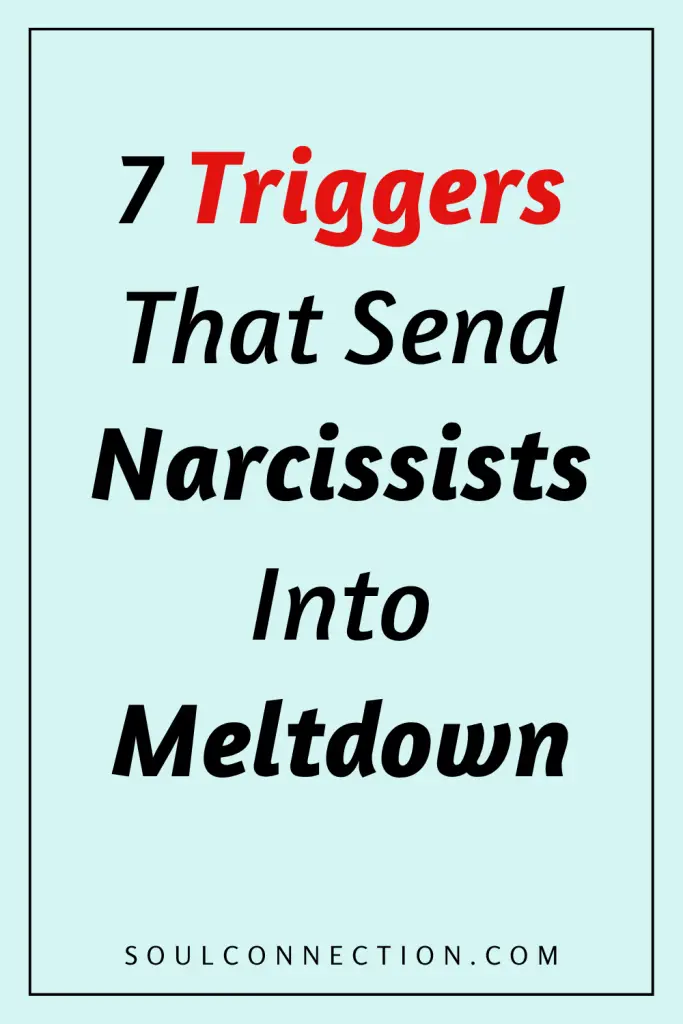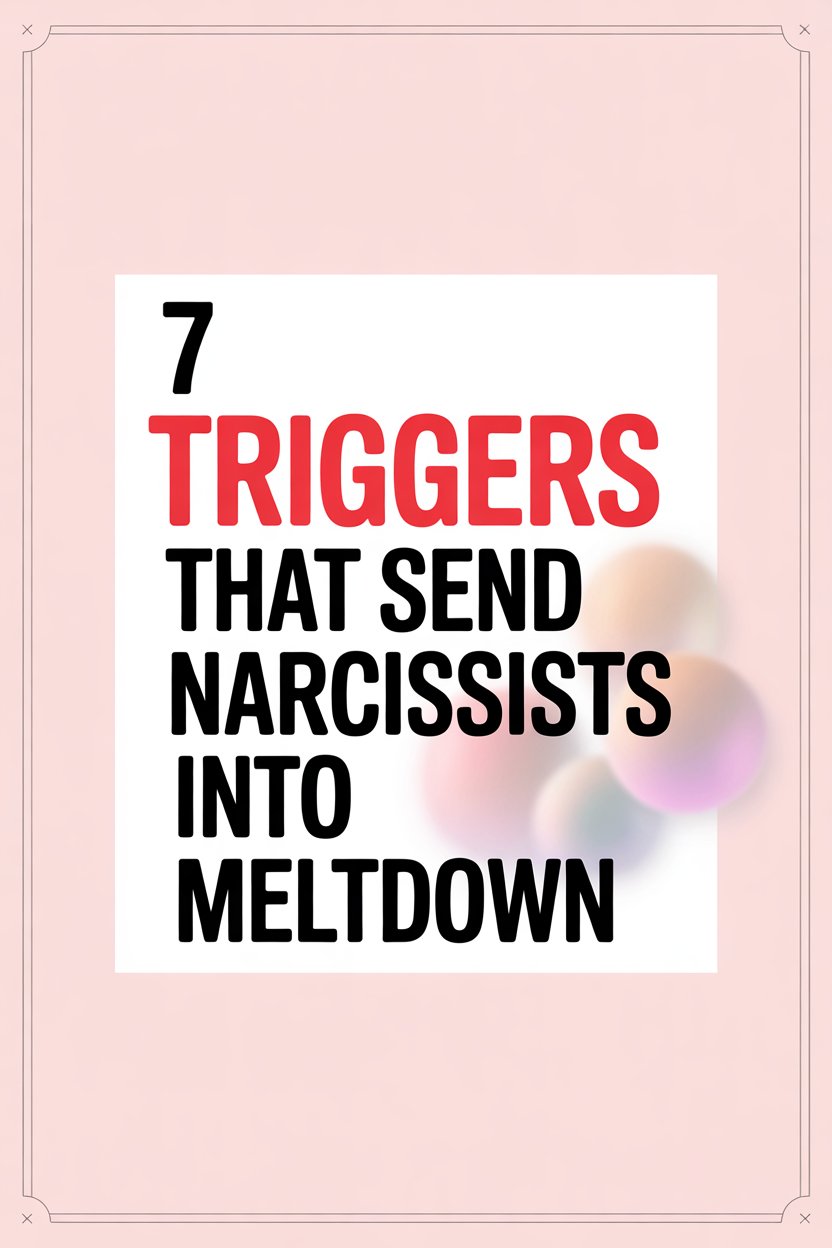Some people can shrug off a little criticism or a dent in their ego. Narcissists? Not so much.
Their confidence looks rock-solid, but the tiniest chip can send the whole thing crashing down like a Jenga tower at a toddler’s birthday party.
If you’ve got a narcissist in your life (parent, partner, boss, or that one friend who treats WhatsApp replies like Olympic events), you know their meltdowns come fast and loud.
Curious about what sets them off? Here’s the cheat sheet—plus a few survival tactics for each.
1. Criticism That Hits Too Close to Home
Call a narcissist out and buckle up—things are about to get dramatic. Even mild, well-meaning feedback can trigger DEFCON 1.
No, you didn’t say their favorite shirt was a crime against fashion; you simply asked if maybe they kept interrupting you at dinner. Next thing you know, you’re cast as the villain in their soap opera.
Why does this sting so much? Narcissists lean on external validation to prop up their self-worth. Criticism, even gentle, exposes the cracks they work so hard to conceal.
Like vampires recoiling from sunlight, they’ll lash out or crumble—anything to avoid facing their flaws.
Tonight’s move: Deliver feedback like it’s a fine wine—slowly, gently, and never when they’re already in a mood. Or, for your own peace, sometimes it’s best to keep that feedback to yourself and stick to boundaries instead.
2. Not Getting the Recognition They Think They Deserve
If you’ve ever made the grave error of not applauding a narcissist’s “achievement” (say, microwaving soup without supervision), you’ve seen the fallout.
These folks expect gold stars for basic decency and Nobel Prizes for vaguely helpful acts.
Being overlooked or—even worse—someone else getting the spotlight? That’s when the meltdown begins. Expect sulking, passive-aggressive digs, or a full-blown “nobody appreciates me” monologue.
Tonight’s move: Don’t fuel the beast. Offer polite acknowledgment but keep it in proportion.
If you’re feeling bold, give genuine praise to someone else in their presence and watch the fireworks (not recommended unless you’re wearing emotional armor).
3. Being Ignored or “Unseen”
If you want to see a narcissist go from zero to existential crisis, try not responding immediately to their text or—heaven forbid—give your attention to someone else.
They thrive on being at the center of your universe, and getting left on read? That’s a slight they won’t soon forget.
Feeling invisible shatters their illusion of importance.
You’ll see panic, rage, or theatrics designed to yank your focus right back to them: sudden “emergencies,” dramatic confessions, or carefully curated Instagram Stories aimed squarely at your guilt reflex.
Tonight’s move: Set tech boundaries and maintain them. Muting your phone for two hours is not a crime. Their discomfort is theirs to manage, not yours.
4. Someone Challenges or Contradicts Them
Ever tried to correct a narcissist’s “fact” (like the time they “invented” avocado toast) or offered a different opinion? Prepare yourself. Even playful debate can spiral into a declaration of war.
To the narcissist, disagreement isn’t healthy discourse. It’s a threat to their identity as the unquestioned authority on, well, everything.
The reaction can range from silent treatment to a full-scale tantrum that would make a toddler blush.
Tonight’s move: Choose your battles. Not everything requires correction, and sometimes silence is more powerful (and less exhausting) than winning the argument.
When things get tense, take a breather. You’re not obligated to outlast their ego.
5. Exposure of Their Lies or Shortcomings
Catching a narcissist in a fib or highlighting an area where they, shockingly, aren’t perfect? That’s the nuclear option.
They’ll fight tooth and nail to dodge accountability, spinning tales faster than a late-night radio DJ.
Being “found out” threatens their carefully curated image. Reactions can get ugly: blame-shifting, gaslighting, or painting themselves as the misunderstood victim.
The aim? Make you doubt your own reality and distract from the original issue.
Tonight’s move: Keep a paper trail. Document important conversations. When confronted with wild storytelling, stick to simple facts and refuse to wade into emotional quicksand.
Don’t expect apologies; expect deflection.
6. Seeing Others Succeed Where They Can’t
Jealousy is a universal emotion, but for narcissists, it’s supercharged. Watching friends, siblings, or colleagues get praise, promotions, or happiness triggers a sense of injustice—how dare anyone else shine?
Suddenly, your achievements become threats. You might notice them minimizing your success, bringing up their own “victories,” or trying to undermine your confidence.
The meltdown, here, is often quieter: sulking, gossip, or backhanded compliments.
Tonight’s move: Stand tall and enjoy your wins. You earned them. Their discomfort is not your fault, and you don’t need to shrink yourself to make them feel better.
If you’re feeling generous, share the spotlight, but don’t hand it over.
7. Loss of Control or Being “Wrong”
Control is the narcissist’s security blanket. When they lose it—plans change, someone else calls the shots, or life throws a curveball—they unravel.
This trigger is especially potent in relationships: if you develop independence or set boundaries, expect the storm.
Admitting fault is like asking them to eat a bowl of cold Brussels sprouts—absolutely out of the question.
Powerlessness exposes their deepest insecurities, so meltdowns here often involve manipulation, guilt-tripping, or dramatic ultimatums.
Tonight’s move: Hold your ground. Reiterate your boundaries calmly and consistently. When the manipulation starts, resist the urge to justify yourself.
A short “I hear you, but this is what I need” can work wonders.
Surviving the Storm
Narcissists operate with rules and expectations the rest of us didn’t get the memo about. Their meltdowns aren’t just random outbursts—they’re panic responses to perceived threats to their fragile self-image.
You can’t control their triggers (and wouldn’t it be grand if you could?), but you can control your responses. Boundaries are your best defense.
Prepare for tantrums, not miracles. Save your emotional energy for people who appreciate it.
And when all else fails? Find a friend, pour a cuppa, and remind yourself that their drama isn’t your responsibility.
Sometimes, the healthiest thing you can do is simply refuse to play the lead in their emotional soap opera.


